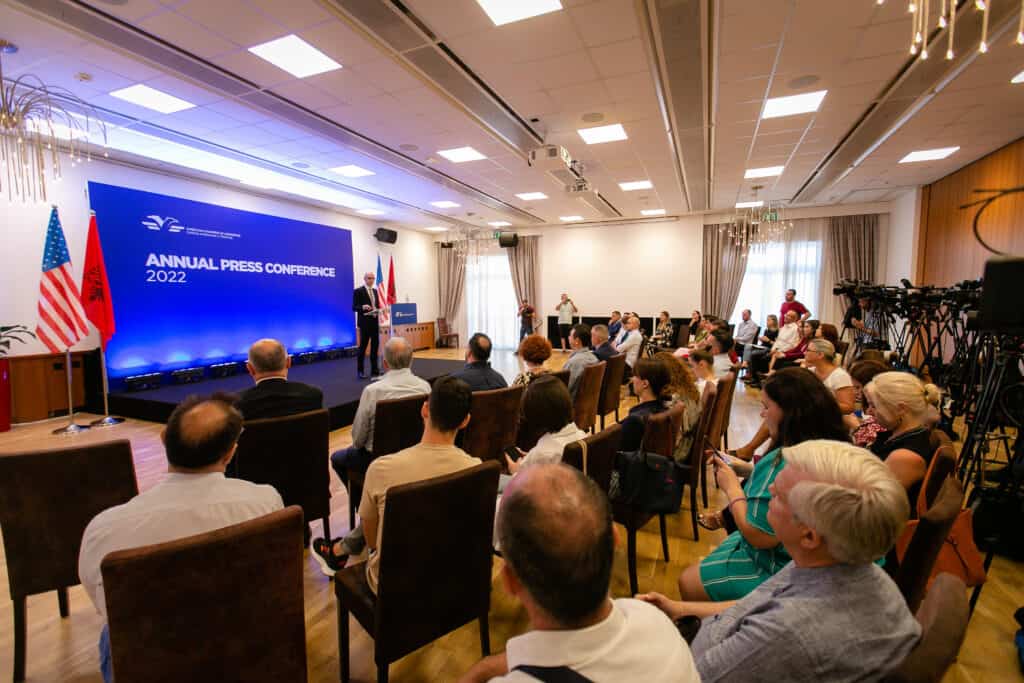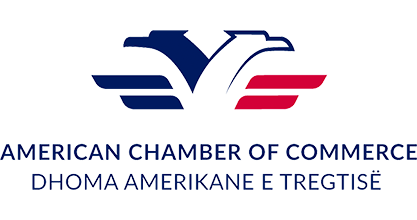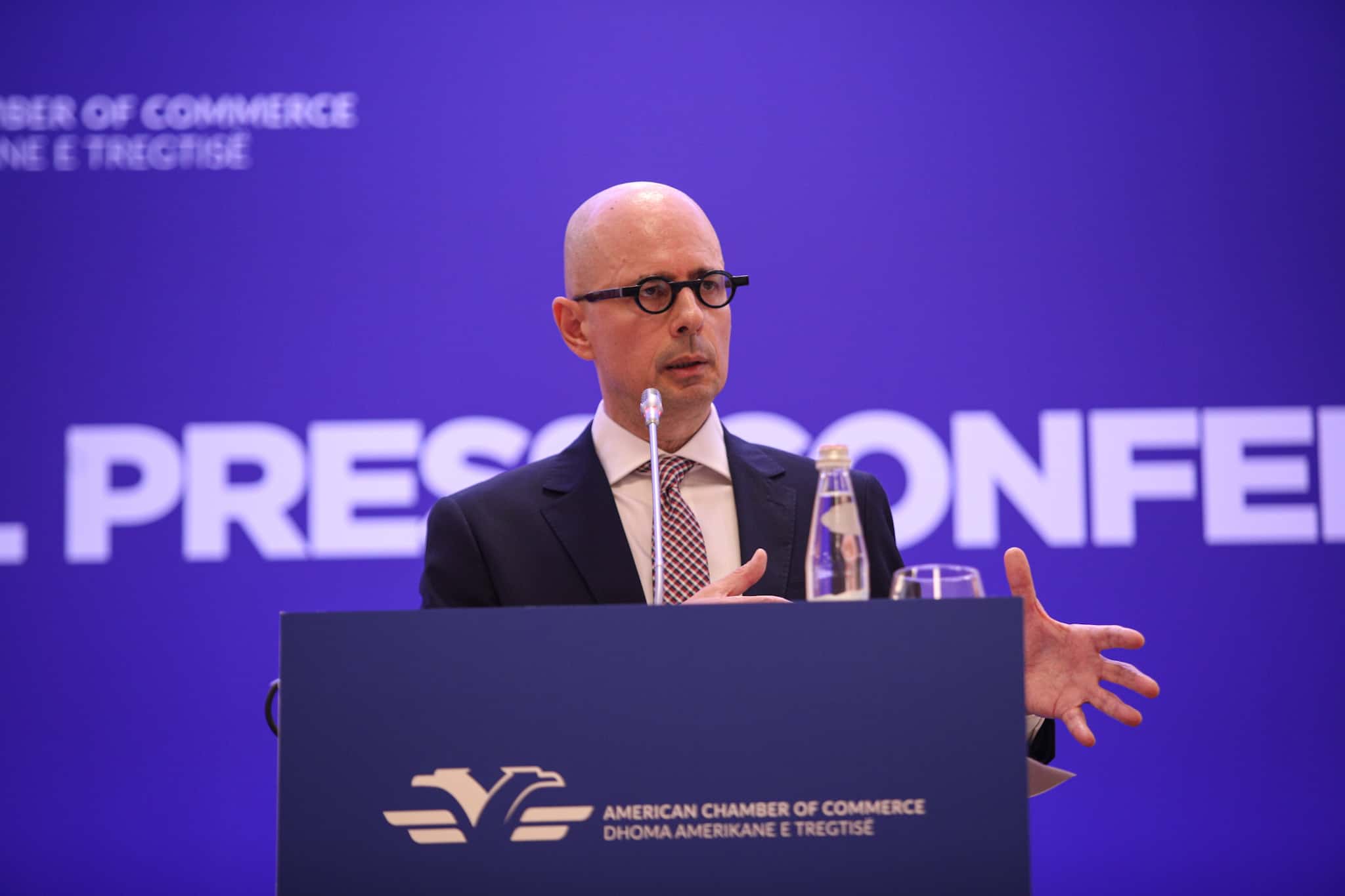


Thank you to all of you for your interest in the AmCham Annual Press Conference, especially to the journalists who have had continued interest in the progress of AmCham’s work.
There are two important topics on which I will focus briefly, and then I’ll open the floor to questions and answers.
First, the focus will be on the progress of AmCham’s work, and, second, on the Investment Agenda, which is very important to us.
AmCham Albania has seen an increase of about 15 percent in membership, and there has been an ever-increasing interest in joining AmCham. The chamber now has 225 member companies, of which 65 companies have entirely American or global capital, 81 companies with partial American ownership and an additional 78 companies that are Albanian-owned but which have aspirations of conducting trade with the United States. These companies represent 30,000 employees and $3.1 billion in annual revenue, which is equivalent to about 20 percent of the Albanian economy. This makes AmCham one of the most powerful business communities in the country. We are cognizant of the weight this has on the Albanian economy as well as the responsibility that comes with that weight.
This year has seen progress in our cooperation with international partners. The two entities with which we work together constantly are the U.S. Chamber of Commerce in Washington and the AmCham network in Europe, especially the part of the network in the Western Balkans region.
Moreover, in cooperation with the U.S. Department of State, but also with the U.S. Department of Commerce, we are building several new channels for Albanian companies that are interested in doing business in the United States and vice versa.
There are two new developments this year!
First, AmCham has become part of the Empower HER global body, in partnership with the U.S. Department of Commerce, aiming to engage AmCham members directly in the economic empowerment of women and women-led enterprises. Any businesses or organizations that have an interest in cooperating with us on this, should contact us directly.
Second, I have the pleasure to announce today that in the fall of 2022, AmCham Albania, in cooperation with the U.S. Department of State, will organize a major regional conference in Tirana, the Digital Technology for Cities Conference, where some of the most advanced Western technologies on Smart Cities will be presented. Large American companies such as Amazon, Google, IBM, GE, and others, as well as the mayors of the 20 largest cities of the six countries of the Western Balkans will participate. I think it will be of interest to everyone.
Third, you are all familiar with the AmCham Business Index, through which we measure the perceptions of the business community in Albania. We are now working with all AmChams in the region to make the index regional — something that will help us measure and compare the performance of different Western Balkans countries and draw out lessons or best practices.
Last, 2021 marked an increase in U.S. investments by €62 million, with a total of €151 million in 2021 compared to €89 million in 2020 and €82 million in 2019. So we have an increase of 70 percent .
We like the increase but we are aware that these are modest figures and below the potential if we compare them with Serbia and North Macedonia. And this brings us to the second and most important topic, which is the Investment Climate.
Investment Climate
You’ve heard a lot about the investment and business climate — so much so that we may have become a little boring. But the importance of this reform has increased in the past two years for several external and internal reasons: global economic challenges and the war in Ukraine have accelerated inflation and brought about disruption of the supply chain of goods, causing disruptions and global economic pressures. Some of these pressures certainly affect Albania as well.
But on the other hand, we have also had a decline in the Business Index for three-four years in a row — which has to do with the confidence of the business community in the economic terrain in which they operate. This is very important, because lower confidence causes many other undesirable effects on investments, capital, departure of human capital, etc.
We can’t do much about the global economic pressures we face. But Albania can do something about a reform that improves the business climate and is tied to all these related benefits.
That’s why AmCham Albania has developed the Investment Agenda — a process that started back in 2020. In conversations with the Government of Albania, we agreed on the need for reform; as a result AmCham created 40 recommendations — solutions — through eight pillars to build a successful investment structure and business climate.
It’s not a simple report — it is part of best practices from AmChams around the world, the largest global network of chambers of commerce, with a presence in more than 110 countries. It is also the fruit of labor of five AmCham Albania committees, which involved more than 40 different experts.
The solutions we offered are already public and have been submitted to the government. I’d like to express appreciation for the role played by the Ministry of Finance and Minister Delina Ibrahimaj in establishing a working group on the implementation of the recommendations.
But I want to be realistic about the results.
The technical breakdown of legal interventions has been the hardest part of the process. So far, as time goes on, the technical process has been slow. We have created a scorecard that measures progress. AmCham considers the implementation process successful if a minimum of 75 percent of the recommendations are met. So far only 33 percent of the recommendations have been implemented. As it has been almost two years since the formal process started, that progress is below our expectations.
But what are the eight pillars of the recommendations?
1. Improved structures for attracting foreign and domestic investments.
Countries that are successful in attracting Foreign Direct Investment have proven direct economic benefits in employment, welfare and increased competitiveness.
A transparent strategy on priority sectors, laws and public investments (in infrastructure, etc.) can lead to the private sector being interested in responding through its own investments. This creates a successful complementary investment cycle between the public and private sectors.
- Shortened procedures – where the best example in the region is North Macedonia. Dominant practices in Albania, where the state representatives meet investors directly are not sustainable. Well-functioning systems have transparent rules and as little interaction as possible with the administration.
- Clear incentives for foreign investment over two variables: the size of the investment and the number of new jobs created.
- Decentralization of the market and reduction in the level of monopolies.
2. Approval in Parliament of an Anti-Corruption Package, focusing on:
Complementary prevention with retroactively-working law enforcement bodies.
Adoption of anti-bribery legislation, following OSCE standards, involving both high- and mid-level officials. (This would make the work of law enforcement bodies easier.)
3. Public procurement system reform is closely related to fighting corruption (we support all EU recommendations):
- Adaptation of Open Data standards for public procurement, including the ties of beneficiaries to avoid corrupt decisions, and a history of past performance of public contractors.
- Elimination of exceptional cases from public procurement to a maximum, or setting clear criteria for when cases become exceptional.
The strongest ally in increasing trust will be the involvement of civil society, media, business community, etc., in overseeing the accountability of public institutions. This would increase transparency, accountability and trust among citizens. This should be assisted and incentivised through public funding.
I take this opportunity to thank media outlets like BIRN, Monitor and Faktoje for their outstanding investigative and reporting work in the public interest. We need to incentivize them, not make their work more difficult.
4. Public Consultation — where the emphasis should be on law implementation.
The law is good but there is no way to force its implementation, so it is often not enforced.
- We recommend the establishment of a number of mechanisms that ensure the law’s implementation and set penalties for violators, or make it mandatory that Parliament rejects laws that have not gone through the proper public consultation process.
- This is one law that when not properly implemented results in major consequences in lack of the public’s trust in governance.
For example: One of the most important recent laws — the change in the tax regime in November 2021 — was a flagrant violation of both the public promise that taxes would not be changed every year and the public consultation process.
5. Tax System
This is very important for businesses — our principles are modern, in line with international accounting standards, predictable (they don’t change every year) and incentivize formalization (not informality) of the economy and make the country competitive in the region.
A new draft for the tax system has been introduced for public consultation. The working groups at AmCham are working on their technical comments, but so far it turns out that three of the four principles AmCham had put forward have not been met.
- The law is not in line with the fight against informality — accepting elements of spending outside fiscal structures, segmentation of businesses by turnover and statute — not profit.
- The element of competitiveness has also not been met — further increasing the tax burden.
AmCham suggestion: Based on the above and as this is a very complex law, it should be subject to the maximum and not the minimum public consultation deadlines. This would bring the full involvement of experts and stakeholders to bring their suggestions for improving the law. The bylaws should also be subject to public consultation.
6. Creation of new opportunities for trade exchanges
In terms of exports or trade exchanges, a more inclusive role should be given to the Albanian diaspora and better conditions should be created for e-commerce.
7. Digital economy priorities
It is important for Albania to have modern laws that enable digital economy growth. This includes legal recognition of electronic signatures (similar to EU or U.S. legislation), imposing restrictions on cash payments and incentivizing electronic payments. The strengthening of the digital economy would have positive side effects, including fighting money laundering — in which Albania unfortunately continues to be in the gray area for several years now.
8. Workforce Training and Upskilling
We have a number of proposals on how the public and private sectors can better work together.
I want to assure you of our maximum commitment to improving the business climate, which continues to be our top priority.

